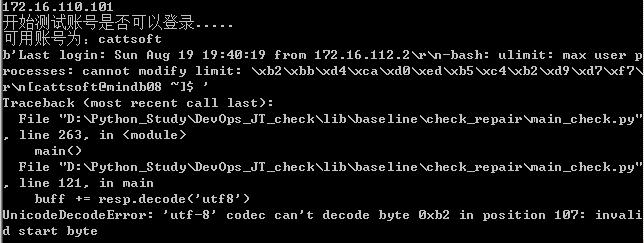彻底解决ssh.invoke_shell() 返回的中文问题
上一篇:https://www.cnblogs.com/apff/p/9484939.html (python如何实现普通用户登录服务器后切换到root用户再执行命令遇到的错误解决 )
接上一篇,前两篇解决中文的问题主要是在字符集上做的手脚,即将中文转成英文,但是有一种情况我们都来不及做转换,即登录时服务器直接返回了中文内容:

此时程序报了如下错误,其实还是字符集问题:

为此:我们可以在接收数据的时候直接对其进行异常捕捉,如果异常则换一种解码方式:
def verification_ssh(host,username,password,port,root_pwd,cmd):
s=paramiko.SSHClient()
s.load_system_host_keys()
s.set_missing_host_key_policy(paramiko.AutoAddPolicy())
s.connect(hostname = host,port=int(port),username=username, password=password)
if username != 'root':
ssh = s.invoke_shell()
time.sleep(0.1)
#先判断提示符,然后下一步在开始发送命令,这样大部分机器就都不会出现问题
buff = ''
while not buff.endswith('$ '):
resp = ssh.recv(9999)
try: #进行异常捕捉,如果解码有问题,则换一种解码方式
buff += resp.decode('utf8')
except Exception as e:
buff += resp.decode('gb18030')
print(resp)
time.sleep(0.1)
print('获取登录后的提示符:%s' %buff)
ssh.send(' export LANG=en_US.UTF-8 \n') #解决错误的关键,编码问题
ssh.send('export LANGUAGE=en \n')
ssh.send('su - \n')
buff = ""
while not buff.endswith('Password: '): #true
resp = ssh.recv(9999)
print(resp)
buff +=resp.decode('utf8')
print('hhhhh')
print(buff)
ssh.send(root_pwd)
ssh.send('\n')
buff = ""
# n = 0
while not buff.endswith('# '):
# n += 1
resp = ssh.recv(9999)
print(resp)
buff +=resp.decode('utf8')
# print(n)
# if n >=3:
# break
# print(buff)
ssh.send('sh /tmp/check/101.sh') #放入要执行的命令
ssh.send('\n')
buff = ''
# m = 0
while not buff.endswith('# '):
resp = ssh.recv(9999).decode()
buff +=resp
# m += 1
# print(m)
result = buff
# print(type(result))
# print(result)
s.close()
if __name__ == "__main__":
verification_ssh('测试IP地址', '普通账号', '普通账号的密码', '52222', 'root密码', 'id')
我们只需要努力,然后剩下的交给时间。






 浙公网安备 33010602011771号
浙公网安备 33010602011771号